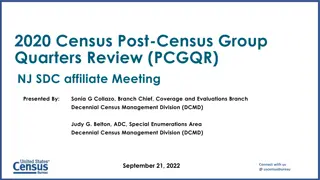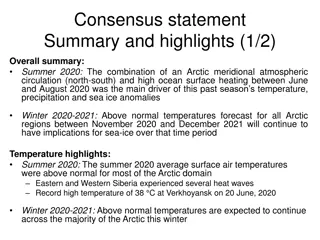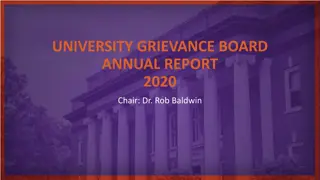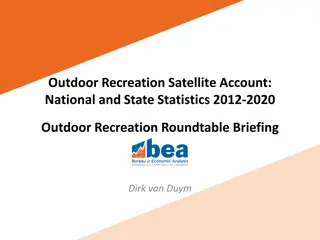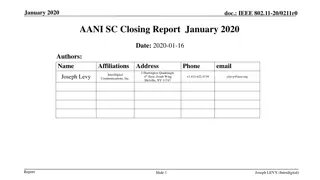
Mastering Past Simple and Past Progressive Tenses
Learn how to form and use the Past Simple and Past Progressive tenses in English grammar. Explore examples, irregular verbs, forming questions and negatives, and practicing with exercises.
Download Presentation

Please find below an Image/Link to download the presentation.
The content on the website is provided AS IS for your information and personal use only. It may not be sold, licensed, or shared on other websites without obtaining consent from the author. If you encounter any issues during the download, it is possible that the publisher has removed the file from their server.
You are allowed to download the files provided on this website for personal or commercial use, subject to the condition that they are used lawfully. All files are the property of their respective owners.
The content on the website is provided AS IS for your information and personal use only. It may not be sold, licensed, or shared on other websites without obtaining consent from the author.
E N D
Presentation Transcript
PAST SIMPLE & PAST PROGRESSIVE Milena Jankovi
Past Simple Tense: Form For regular verbs, we add ED to the base form of the verb Examples: work + ED worked play + ED played For irregular verbs, there is a list of irregular verbs. Examples: go-went come-came
Questions and negatives We use auxiliary verb DID to make questions and negatives. AFFIRMATIVE INTERROGATIVE NEGATIVE Max played football. Did Max play Max did not play football. football? You met John yesterday. Did you meet John yesterday? You did not meet John yesterday.
Verb to be The verb to be has two forms in the past: WAS and WERE AFFIRMATIVE INTERROGATIVE NEGATIVE I was not happy. I was happy. Was I happy? You were not late. You were late. Were you late? It was not cold. It was cold. Was it cold? They were not at home. They were at home. Were they at home?
Students book, page 28; exercise 1 Grammar 1. Study the examples and complete the sentences. Use Past Simple: I finished my homework on time. I didn t find my History book. Did you forget Mary s birthday? Were you at the cinema last night? 1 A: When_______ (be) your parents anniversary? B: They _______ (celebrate) it last month. 2 Mr. Davis _______ (live) in Africa a few years ago. Andy _______ (not know) that. 3 They _______ (decide) to stop the match because the weather _______ (be) bad. 4 A: _______ (you/buy) a present for Jane s birthday? B: Oh, no, I completely ________ (forget) about it. 5 Where _________ (be) you last night? I _________ (go) to the supermarket. 6 She _______ (try) to finish her project on time but she ______ (not do) it.
Answers: 1 A: When was your parents anniversary? B: They celebrated it last month. 2 Mr. Davis lived in Africa a few years ago. Andy didn t know that. 3 They decided to stop the match because the weather was bad. 4 A: Did you buy a present for Jane s birthday? B: Oh, no, I completely forgot about it. 5 Where were you last night? I went to the supermarket. 6 She tried to finish her project on time but she didn t do it.
Past Progressive: Past Progressive: Form Form AFFIRMATIVE Example: S (subject) + was/were + V (verb) + ing She was cooking all morning. INTERROGATIVE Was/were + S + V + ing ? Example: Was she sleeping when you came home? NEGATIVE Example: S + was/were + not + V + ing She was not sleeping when I came home.
2. Underline the correct answers: 1 What was Mr. Davis doing/is Mr. Davis doing last night? 2 Jane and Kate was/were playing some music at 10 A.M. yesterday. 3 Steve weren t/wasn t expecting any guests last night. 4 We aren t/weren t cleaning the house yesterday morning. 5 Mr. Davis is talking/was talking on the phone 1 hour ago. 6 Were they waiting/Was they waiting for us yesterday?
Answers: 1 What was Mr. Davis doing/is Mr. Davis doing last night? 2 Jane and Kate was/were playing some music at 10 A.M. yesterday. 3 Steve weren t/wasn t expecting any guests last night. 4 We aren t/weren t cleaning the house yesterday morning. 5 Mr. Davis is talking/was talking on the phone 1 hour ago. 6 Were they waiting/Was they waiting for us yesterday?
Past Simple & Past Progressive: Differences Past Simple Past Progressive -action finished in the past (single or repeated) -action was in progress at a special time in the past -series of completed actions -two actions were hapenning at the same time - for background action or description which was interrupted by another past action
SB; page 29; Exercise 3. Study the examples and use the correct form of the verbs in brackets. I got up at seven and then I went to work at 8 o clock. Andy was going to school when he met Steve. My sister was cooking lunch, while I was sleeping. 1 She ____ (listen) to music, while I _____ (clean) the house. 2 Jane and Kate ______ (talk) when Mr. Davis _____ (come) in. 3 Mr. Davis _____ (be) sick and he _____ (not go) to work yesterday. 4 We ______ (watch) the movie when the phone ______ (ring). 5 A: What _____ (you/do) at 8 last night? B: I _____ (prepare) dinner. 6 Mrs. Richards _____ (paint) her room when she _______ (fall) down. Luckily, she _____ (not break) anything. 7 I _____ (take) a shower when I _____ (hear) the doorbell. My guests _____ (arrive) earlier. 8 I _____ (come) to the office and then I _____ (check) my e-mails 9 He _____ (check) her mail when Jim _____ (arrive) in Athens. 10 We ______ (write) while our teacher _____ (talk) all morning yesterday.
1 2 3 4 5 6 She was listening to music, while I was cleaning the house. Jane and Kate were talking when Mr. Davis came in. Mr. Davis was sick and he didn t go to work yesterday. We were watching the movie when the phone rang. A: What were you doing at 8 last night? B: I was preparing dinner. Mrs. Richards was painting her room when she fell down. Luckily, she didn t break anything. I was taking a shower when I heard the doorbell. My guests arrived earlier. I came to the office and then I checked my e-mails He was checking her mail when Jim arrived in Athens. 10 We were writing while our teacher was talking all morning yesterday. 7 8 9
HOMEWORK Activity book, page 20 Exercise 2 Complete the table. Exercise 3 Use the sentences from the table in exercise 2 and complete the text.

